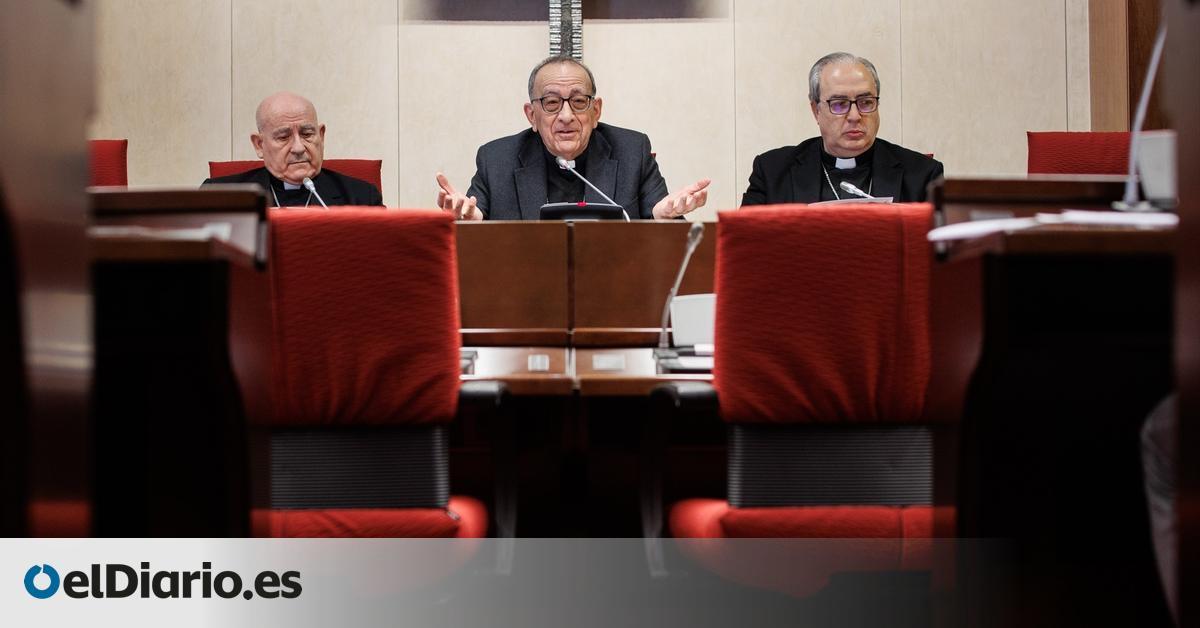
The Catholic hierarchy continues to resist collaborating with the clarification of the scandal of sexual abuse committed against minors within the Church. At the end of November, the State Attorney General’s Office requested the 70 dioceses to report those cases of pedophilia of which they became aware through the victim assistance offices that Pope Francis forced them to open. Three months later, less than half (29) have responded and only four have provided significant data, such as names of victims, according to data from the Public Ministry to which elDiario.es has had access. They are the dioceses of Barbastro, Barcelona, San Feliu and Vitoria. 41 did not even respond.
The bishops give instructions to limit the information they provide to the Prosecutor’s Office on cases of abuse
Further
The other 25 dioceses that did respond to the Prosecutor’s request did so evasively and following a response model set up by the Spanish Episcopal Conference (CEE), which has tried to control and limit the information that these entities made available to the institution. public. 18 responded with the first model letter, designed for those dioceses that have no record of complaints or testimonies. And another seven did so with the second, reserved for cases in which the complaints or testimonies collected “have already been brought to the attention of the competent Prosecutor’s Office in a timely manner.” In their answers they referred, therefore, to what had already been sent to the provincial prosecutors.
In addition, no diocese reported possible cases of abuse in the different institutes of consecrated life or societies of apostolic life that depend on them, such as schools. The argument is that they are not competent to do so because they are “autonomous entities with their own legal personality” and different from that of the bishopric. Journalistic investigations have documented dozens of cases of abuse in educational centers and congregations in recent years.
The State Attorney General, Álvaro García Ortiz, advanced part of this data in an appearance this Thursday in the Senate, where he regretted the “very little information” received. He announced that in the “next few days” he will directly address congregations and religious entities to which the responses of the Episcopal Conference allude “to gather data on abuses that the prosecution still lacks and about which it has not been informed” . According to sources from the Public Ministry, information will be requested from 23 religious orders, including Opus Dei, Legionaries of Christ or the Neocatechumenal Way. Also to other congregations that have already admitted cases of abuse such as Jesuits, Piarists or Marists.
The instructions of the bishops
The information provided in parliamentary headquarters by the attorney general reveals that the dioceses have strictly followed the guidelines of the Episcopal Conference in the sense that they should limit the information that they made available to the Public Ministry. In a letter, the Secretary General of the EEC, César García Magán, advised the dioceses not to notify the State Attorney General’s Office of any case that had not been previously communicated to the provincial prosecutor’s office and that the response be coordinated by the attorney representing to this organization. And even to facilitate that unanimous response, he attached the aforementioned letter models that most of them have used.
The Prosecutor’s Office asked the dioceses at the indication of the Episcopal Conference itself, to whom it had previously been addressed after having received in June 2022 a letter that reproduced the investigation carried out by The country about these abuses. “Assessing that gesture,” García Ortiz explained on Thursday, the Prosecutor’s Office asked the Episcopal Conference to report “those cases of which they were aware” in order to “size up the phenomenon” and “assess each case individually.” But the bishops replied that they did not have “competence” to do so and indicated that each diocese should be contacted individually. Months later it has been shown that this route has not been effective either in shedding light on the drama of sexual abuse of minors within the Church.
The attorney general also revealed that the institution he presides over is preparing a study “on the procedural alternatives to repair the victims, in cases of prescribed acts” and in which the aggressor has died. “This study will analyze the international and regional references, always keeping in mind that the main thing is to provide the victims with a platform for listening, recognition and subsequent reparation for the events suffered,” he explained. The obtaining of information to elaborate this report motivates the frustrated requests for information to the dioceses.
One of the main stumbling blocks in reporting and prosecuting pedophilia in the Church are the statute of limitations. This is a circumstance that is partly remedied by the Law for the Protection of Children and Adolescents from Violence, which increases the statute of limitations for the most serious crimes committed against minors. Since its entry into force, the time that the victim has to report begins to count from the time she turns 35.
Before, that limit was set at the age of majority. Depending on the seriousness of the facts, the statute of limitations for these crimes is between 5 and 15 years. In other words, until the approval of this law, at most, a victim could file a complaint up to 33 years of age in the case of the most punishing sexual offense and now that margin is extended to 50.
A year ago, the accumulation of testimonies from victims raised the institutional pressure on the pedophilia scandal in the Church. Then, the State Attorney General’s Office ordered the 17 senior prosecutors to report on the criminal proceedings open at that time regarding assaults and sexual abuse of minors in congregations, schools or any Church institution. In mid-February, the Prosecutor’s Office reported that 68 ongoing investigations had been detected.
Weeks later, in March, Congress commissioned the Ombudsman to investigate cases of sexual abuse in Catholic institutions in recent decades. The mandate was approved by all groups in the Chamber, except Vox. The team to investigate this matter is divided into “three areas of action”: an advisory commission of experts, a forum for dialogue with the victims’ associations and the Victim Care Unit (UAV). In its first two months of life, this last body treated 201 victims.
In parallel, the Episcopal Conference commissioned the firm Cremades & Calvo Sotelo to carry out a private audit on these abuses. elDiario.es reported this Thursday that this investigation points to a figure of around 4,000 victims, eight times more than those recognized up to now by the bishops and a much higher figure than that presented by various journalistic inquiries. The firm’s task has been directed in these months in two directions. On the one hand, to talk to victims, which has materialized in some 120 interviews. And, on the other, to review the ecclesiastical archives in order to draw up a map of what has happened in the last sixty or seventy years. The limit, somewhat diffuse, is placed around the fifties.
––––––––––––
Before you stop reading…
elDiario.es is financed by the contributions of 60,000 members who support us. Thanks to them, we can write articles like this one and that all readers – including those who cannot pay – have access to our information. But we ask you to think for a moment about our situation. Unlike other media, we do not shut down our journalism. And that makes it much more difficult for us than for other media to convince readers of the need to pay.
If you get information from elDiario.es and you believe that our journalism is important, and that it is worthwhile for it to exist and reach as many people as possible, support us. Because our work is necessary, and because elDiario.es needs it. Become a member, become a member, of elDiario.es.
Source: www.eldiario.es

